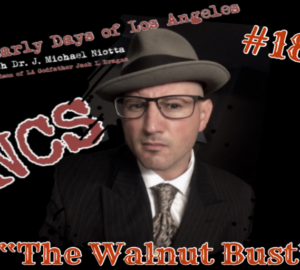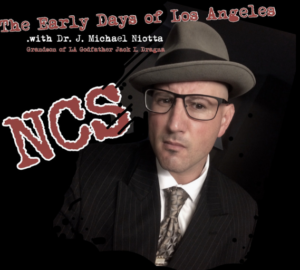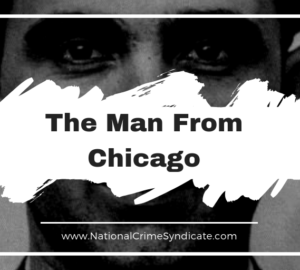4 minutes
Installment 6: Prelude to the Kefauver Hearings
In April of 1950, the Senate Gambling Investigating Committee gathered in Washington DC. On the table, was a new bill that they expected would put “a ban on interstate transmission of race horse information.” Chairmen McFarland and his men were on a crusade to rid the nation of the racing wire service which “the country’s thousands of bookies” relied on. Though top officials from such major cities as New Orleans and Miami testified before Congress during these sessions, authorities from Los Angeles took the spotlight. After declaring bookmaking “the most menacing in the entire field of organized crime,” LA Mayor Fletcher Bowron highlighted one very important point—“horse racing is legal in California.” According to Mayor Bowron, this had thwarted much of the state’s law enforcement efforts. With track betting legal, judges remained “reluctant to punish bookies.”

Tackling the broader issue were Bowron’s Chief of Police, William A. Worton, and the city’s captain, Lynn White. New to their titles, the pair took up their roles in the year prior, following the embarrassing resignation of Chief Horrall. Capt. White’s task of handling the the “war on hoodlums” began in October of ’49, immediately following the disbandment of the LA Gangster Squad. This controversial task force found itself reassigned just three short months after Chief Worton took over. The LAPD was receiving a much needed cleanse.
Approaching the larger topic before the committee, Chief Worton explained that “a nation-wide crime and gambling syndicate” existed. Though aware of its presence, Worton and White believed the arrangement to be little more than a “loose confederation.” Chiming in, Capt. White added that he felt the death of Nation Wide News owner, James Ragen, who was murdered in Chicago several years earlier, was not only significant, but deserved further investigation. White stipulated that no other single incident illustrated better the large scale connection between professional gamblers and organized criminals.

Providing the committee with intel on the darker side of the racing wire, Chief Worton delved into the history behind this connection. Newsmen reported that Worton’s testimony divulged that
“organized mobs began to move in on the racing information business” in 1936.
At this time, Moses “Moe” Annenberg sat at the helm, holding a near monopoly. Lucrative, the trade had long enticed the Chicago Outfit. Although their efforts had proven fruitless thus far, by the end of the decade, the pressure Annenberg felt had become too much. His manager, James Ragen, took over. When questioned who headed distribution of the service after Ragen’s violent removal, Capt. White named Ragen’s son-in-law, the San Diego-based, Russel Brophy. Offering a caveat White added that Brophy was merely “a front man,” and that the true “backers” on the West Coast were Al Green and Jack Dragna, whom he referred to as “hoodlum associates of Frank Costello.” This marked the first time Costello’s name came up during the subcommittee’s discussions, but it would not be the last. Capt. White labeled Costello the
“reputed head of the nation-wide gambling syndicate.”

There is no doubt that Russel Brophy’s run in with Joe Sica and Mickey Cohen also came up before the committee. At the request of Benjamin Siegel, the pair sent Brophy a message by tearing up his office. He needed to get on board. Earlier racing wire incidents on the West Coast surfaced during this meet as well. Prior to Brophy’s involvement, a man named Gene Normile headed things up. Normile was the former manager of boxer Jack Dempsey.
Leaving Chicago in late ’26 to oversee Moe Annenberg’s interests, Gene Normile quickly became integral to the racing information industry out West. He was well known in Los Angeles and San Diego, and to Annenberg’s delight, in just over a year, Normile added the newly opened Agua Caliente Track to the racing service’s roster. But Normile didn’t work for Nation Wide. His move to SoCal predated that service. Instead, Normile worked for an earlier service known as the General News. Though not a sole proprietor, Annenberg owned the controlling share in this company, having purchased more than forty percent of the business from its originator, Mont Tennes.
Like Annenberg and Brophy, Normile ran into his share of problems while affiliated with the wire. It was late 1936 that he admitted to a shocked committee that LA bookmaking was a hundred million dollar a year venture. Not long before making this announcement, Normile was approached about sharing some of the profits. It was Johnny Roselli who paid Normile a visit, informing him that from now on he would be handing over 10% of the take.

Relaying these events to McFarland’s committee, Capt. Lynn White explained that Gene Normile telephoned Annenberg to confirm the arrangement with the LA family. Apparently, he even complained they couldn’t afford the added expense. Annenberg’s response to the gripe was simple—pay it, even if you have to “take it off the top.”
As if a catalyst, the testimony Capt. Lynn White gave in DC peaked the interest of another committee. And that very next month, Chairman McFarland met up with the head of the Senate Crime Investigating Committee—Estes Kefauver. After conferring over McFarland’s progress on the bookie situation, Kefauver announced to the press that his own committee would soon “complete the work of the McFarland group.”

Dr. J. Michael Niotta will be headlining a panel at the Las Vegas MobSummit at the Plaza Hotel over Father’s Day weekend. He has recently been in discussion with the staff at the Las Vegas Mob Museum about holding a lecture and book signing later this year. His current projects include the biography of his great grandfather, Jack Dragna, titled “Dragna: Beneath the Hollywood Mafia Mask,” an early history of organized crime in Southern California co-authored with esteemed mafia researcher, Richard N. Warner, and a WWII story that focuses on the Italian American contribution and the horrendous treatment of their families along the California coast.
Niotta’s true crime debut, “The Los Angeles Sugar Ring” is available now. For more details, visit www.jmichaelniotta.com
- The Walnut Bust: The Early Days of Los Angeles With Dr J. Michael Niotta - May 21, 2020
- The Cornero Gang & the Infamous Page Brothers: The Early Days of Los Angeles With Dr J. Michael Niotta - June 4, 2019
- The Man From Chicago: The Early Days of Los Angeles With Dr J. Michael Niotta - December 12, 2018









